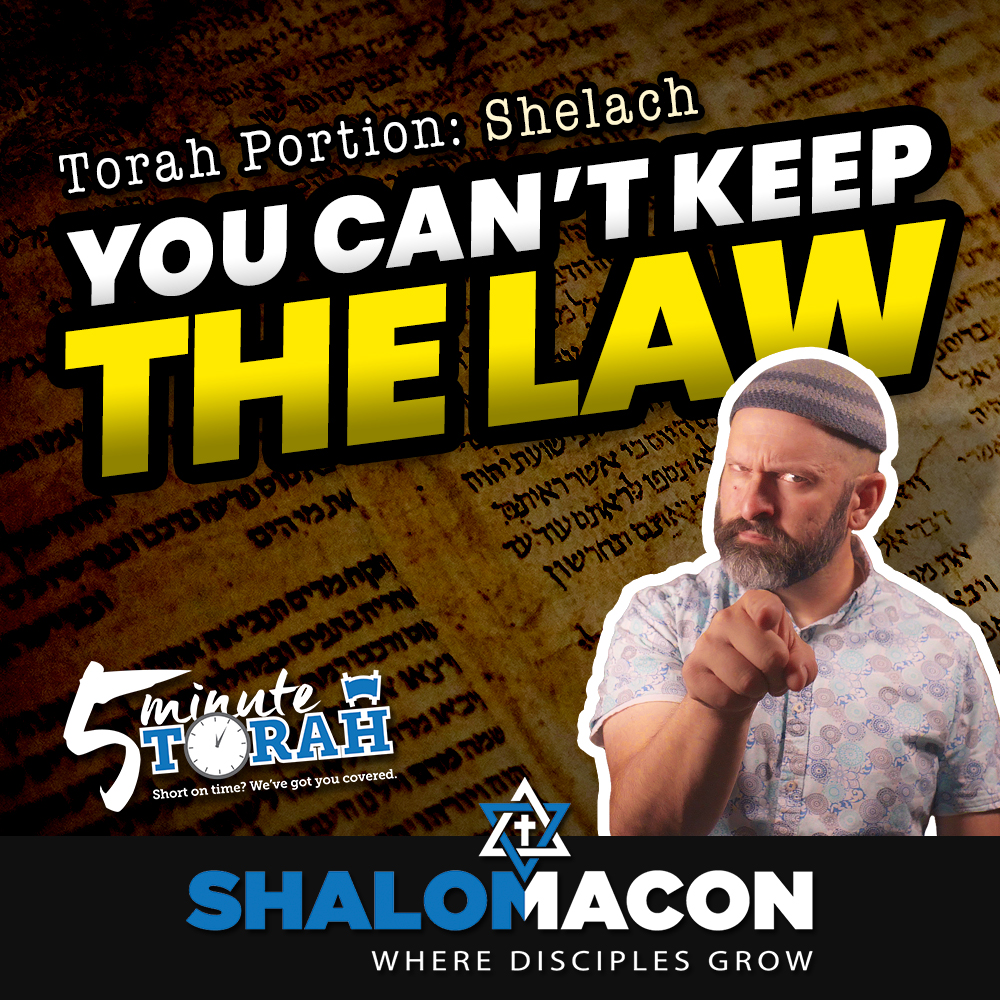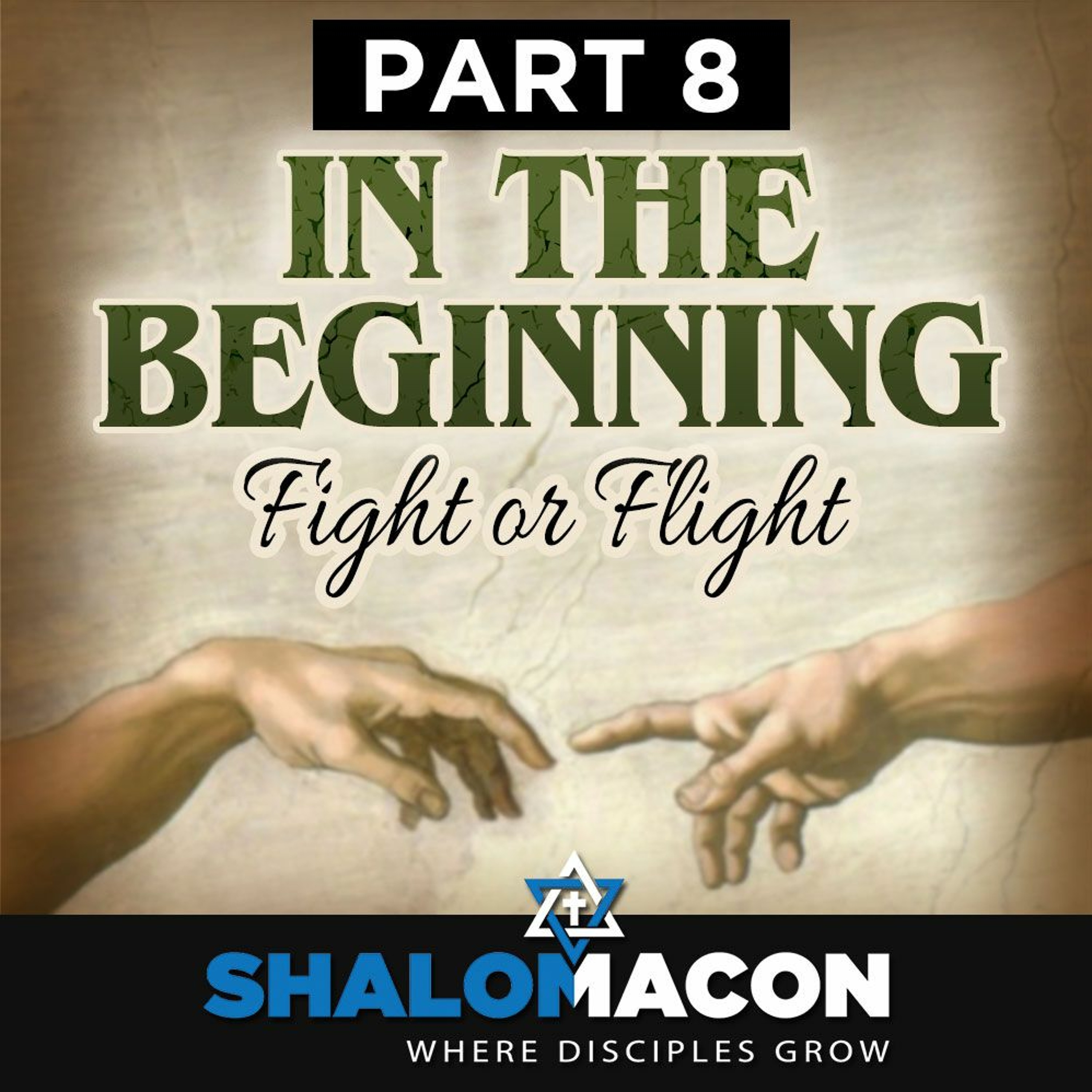Episode Transcript
[00:00:00] You can't keep the law. No one can and no one ever could. That's why Jesus came, to keep it perfectly so we don't have to. Have you ever heard that? Have you ever said that sometimes people say things without any clue of what they're saying. They may even try to use Scripture to prove their point. Take the example from this week's Torah portion about the man who was stoned to death because he was picking up sticks on the Sabbath. Is God so petty that he wanted people killed for minor violations of the Torah and did he make the law impossible to keep to convince us of our need of a Savior? Let's take a look at these difficult questions in this week's five Minute Torah Shalom and blessings from Shalom Macon, the place where disciples of Yeshua learn and connect and grow. I'm Darren, and before I get into the five minutes of my five Minute Torah commentary, let's cover a few quick facts about this week's Torah portion. This week we are studying the 37th portion, the portion of Shalach numbers 131 through 1541 and here are the three things that you need to know about it. Number one Moses intercedes standing in the gap in the Torah portion of Shalach following the negative report of the 10 spies and the subsequent rebellion of the Israelites, the God threatens to destroy the children of Israel for their lack of faith. Moses intercedes on their behalf, pleading with God to forgive them. He appeals to God's attributes of mercy and recalls his promises to the patriarchs. Moses argues that destroying the Israelites would cause other nations to question God's power and his faithfulness. God responds to Moses plea by pardoning the people, yet decrees that the current generation will not enter the Promised Land. The only exceptions are Joshua and Caleb. This act of intercession by Moses highlights his role as a mediator, emphasizing the importance of the Good shepherd in both guiding and advocating for the children of Israel.
[00:01:59] Number two the Sabbath Breaker More than Sticks and Stones in the Torah portion Shalach, a man is found gathering sticks on the Sabbath. Although it is unclear from a surface reading of the text what commandment he is violating, we find out the severity of his actions. As things escalate, the people bring him to Moses and Aaron and ask what should be done with him. God instruct instructs Moses that the man must be put to death by stoning, and the community carries out the sentence. This severe punishment not only serves as a stark reminder of the sanctity of the Sabbath, a covenantal sign between God and Israel, but it also allows us to read between the lines and distinguish between intentional and unintentional sins based on the context of this passage and Number three Fringe Benefits the Commandment of Tse in this week's Torah reading, God commands the Israelites to wear tzitzit, or fringes, on the four corners of their garments with a thread of tekhelet, a particular type of blue, in each fringe. This commandment serves as a visual and tactile reminder for Israel to observe all of God's commandments and to live a holy life. The tsetse are meant to help the children of Israel remember that their duty to God is to avoid being led astray by their own desires. By looking at the tsetse, they are reminded of their covenant with God and the importance of obedience and holiness. When seen outwardly, the tzitzit are a sign that the Jewish people are distinct from all the other peoples of the world Are you a disciple of Yeshua? There are a lot of people who say they are, but when it comes down to it, they really don't even know what it means to be a disciple. Why? Because discipleship is a concept unique to Judaism. It's an intimate relationship between a rabbi and his student. Yeshua called 12 men to be in his inner circle of discipleship, and those 12 men changed the world. What did they know about being a disciple that we don't? I wrestled with this question when I wrote my book the Four Responsibilities of a Disciple. There were a ton of books already written on how to make disciples, but I wanted to know what it meant to be a disciple, because it seems that all of these disciples that were being made in our day really weren't having an impact on the world around them like they should. I found out that there were four responsibilities every disciple should know, and that when implemented, living out these four responsibilities has the potential to change the world. If you want to know what it means to be a true disciple of our Master Yeshua, then check out my book the Four Responsibilities of a Disciple, using the link below. This week's Torah commentary is called guilty of one, guilty of all, and comes from my book, Five Minute Torah, Volume 3.
[00:04:34] Many Christian commentators are quick to point out the strict system of justice found within the Mosaic Law. Quoting from the Book of James, they say, for whoever keeps the whole law but fails in one point has become guilty of all of it. James 2:10 According to this understanding, if a person committed even a minor offense, his life was in jeopardy and he should be wary of execution by stoning or maybe even a stray lightning bolt?
[00:05:01] If this is the case, then it would seem that the reason punishments under the Mosaic Law were so severe when was because breaking a single commandment was the same as breaking all of the commandments at once, rejecting God's law in its entirety. Therefore, a modern evangelistic tactic has developed that uses the Torah to point out the fact that we are all sinners. Those who use it point out that if we have broken even one of the commandments, then we stand condemned by God's law and deserve death. From this position, they can then tell the person why they need Yeshua to forgive them for being a lawbreaker who deserves to die. But is that really an accurate picture of what we find within the Torah? Is the God of the Hebrew scriptures a cranky, irritable, vengeful God who is bent on the annihilation of humanity? When we read the incident of the Sabbath breaker in numbers 153236 in this week's Torah reading, out of its context, this would seem to be the case. A man is caught gathering sticks on Shabbat and he is put to death. But nothing is mentioned in the Torah up to this point that gather sticks on the Sabbath was forbidden. It seems pretty excessive, right? However, if we read the incident in context, we can quickly see that this man was clearly doing more than just gathering sticks. Just a few verses before this event. The Lord instructs the children of Israel that if a person sins unintentionally, in other words, he doesn't know he is sinning. He is to bring a sacrifice, and he will be both atoned for and forgiven. See chapter 15, verse 27. There's no harsh penalty for the one who sins unintentionally. He simply has to apologize and make things right between himself and God. The person who sins with intention, however, is dealt with more harshly. But the person who does anything with a high hand, whether he is native or a sojourner, reviles the Lord, and that person shall be cut off from among his people because he has despised the word of the Lord and has broken his commandment that that person shall be utterly cut off, his iniquity shall be on him. This is numbers 15, verses 30 and 31. If we have a full understanding of what is required of us, yet shake our fist at God, and proceed to do things our way, then this is where things start to go south. There's a vast difference between intentional and unintentional sins, as we've seen in the Passage above, unintentional sins have no real consequence. Once a person realizes his wrongdoing, he corrects it and then moves on. But if that's the case, why was this man taken out and stoned to death? It seems that picking up sticks on the Sabbath would be an innocent mistake. Under normal circumstances, this would be the situation. The person would be informed of their mistake by witnesses who saw him violating God's instructions. But in this instance, he must have been well aware of what he was doing and refused to be corrected. In order to warrant the death penalty, he had to have refused to listen to his brothers and sisters warning him of this violation. If we go back to the passage in James and look at the context, we can see that he is speaking to those who are treating the poor with indignation. Rather than treating everyone with respect, they are showing more respect to those who are wealthy. James tells his audience, if you really fulfill the royal law, according to the Scripture, you shall love your neighbor as yourself. You are doing well. But if you show partiality, you are committing sin and are convicted by the law as transgressors. This is James, chapter 2, verses 8 and 9. His rebuke is directed to the one who thinks that a specific commandment in the Torah does not apply to him and that he can therefore ignore that particular commandment. In some sense, he feels that he is above the law, so to speak. This is exactly the problem Paul is addressing when he writes to the congregation in Rome. Do you suppose, O man, you who judge those who practice such things and yet do them yourself, that you will escape the judgment of God?
[00:09:00] Some think that the rules apply to everyone but themselves. This is the type of person both James and Paul are speaking of. They're not speaking of a person who makes honest mistakes or gets off track on occasion. There are times in our lives when we don't measure up. It's called sin. Sin means missing the mark. But unless we are pursuing sinful behavior, we don't have to worry about being at the brunt of God's wrath. John reminds us of this principle when he says, all wrongdoing is sin. But there is sin that does not lead to death. This is 1 John 5:17.
[00:09:32] Did God intentionally create a law that was too difficult to follow? No. Does all sin put us in the danger of God's wrath? No. If we are breaking one commandment, then are we guilty of breaking them all?
[00:09:45] No. Should we repent and make amends if we stumble? Absolutely. Is God merciful to those who love him and walk in his ways unquestionably. Therefore, let us relay this merciful God to others rather than painting a picture of a bloodthirsty pagan deity in order to point people to Yeshua. After all, it's his kindness that leads us to repentance, not his wrath.
[00:10:09] Do we all get it right all the time? No, of course not. But neither should we be constantly giving in to temptation either. If you're struggling with your flesh and want to live an overcoming life, then let me help with my three part teaching called Killing my old man. Just click on the link right here to get started. Sam.



